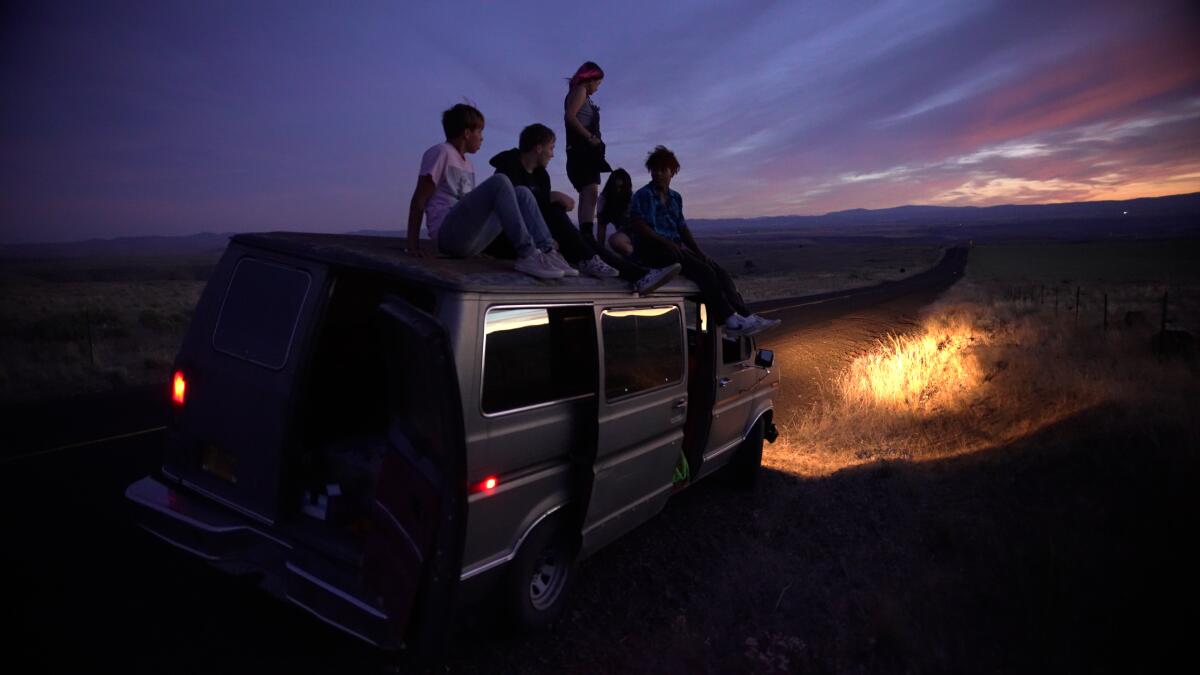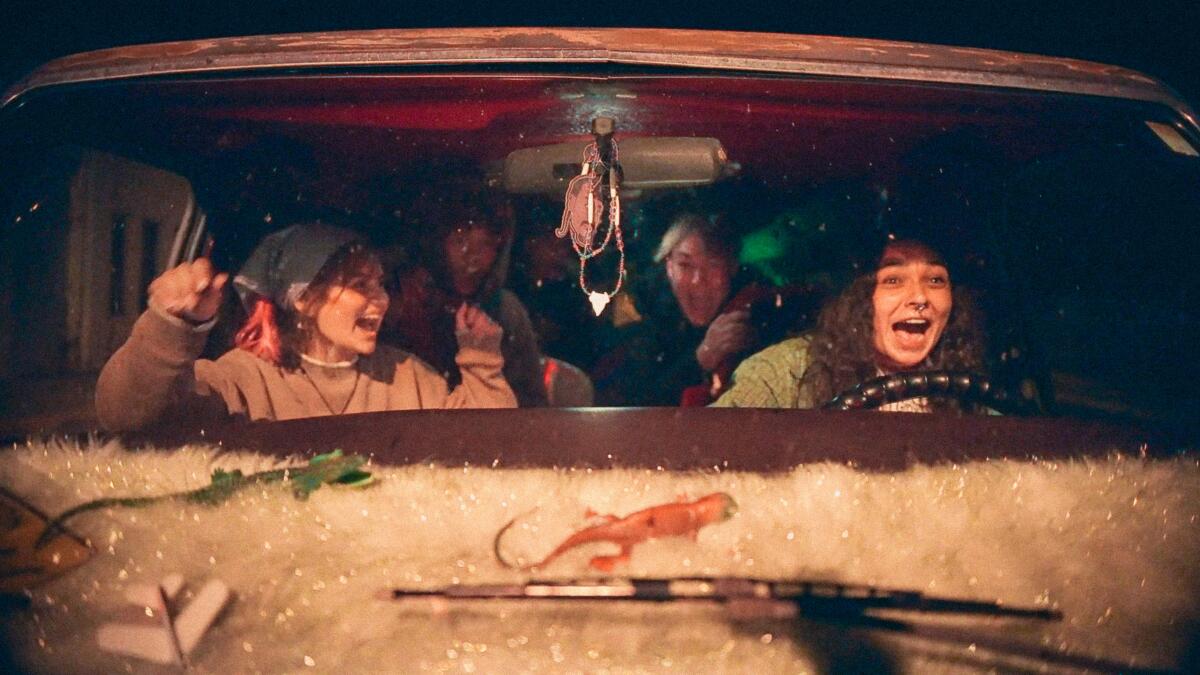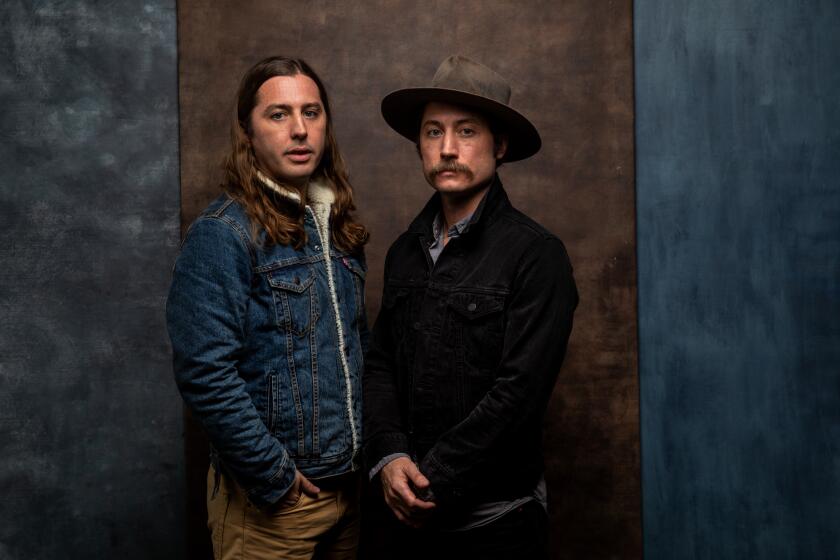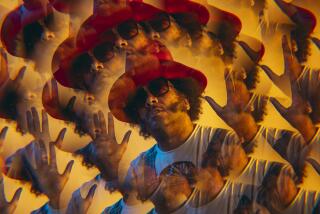Review: In âGasoline Rainbow,â carefree kids hit the road during a fleeting moment when they can

The New Orleans-based filmmaking brothers Bill and Turner Ross have made a name for themselves over the past 15 years with their lyrical, poetic documentaries. But with 2020âs âBloody Nose, Empty Pockets,â they blurred the line between fiction and nonfiction, setting up an imaginary scenario in an actual dive bar on its last night of business, observing a curated group of regulars as they shut it down for good.
The new âGasoline Rainbowâ is their first official narrative feature, informed by their documentary roots and eye for capturing spontaneous beauty. During the Covid-19 quarantine of 2020, Bill and Turner Ross dreamed up a wild road film, which they loosely scripted and cast with five young first-time actors from Oregon. They play a group of friends from a small town called Wiley, who hit the road with the only things you need for an adventure: a dream, a posse, a van and the abiding belief that âanywhereâs better than here.â
The dream is to see the Oregon coast, 513 miles from their landlocked town. The posse is three boys â Makai Garza, Micah Bunch and Tony Aburto â and two girls, Nathaly Garcia and Nichole Dukes. The van gets them started on their adventure, but they soon learn that itâs not a necessary component. After spending the night partying in a cow field with a guy they meet on the side of the road, they return to find the van on blocks, vandalized, the tires stolen, and thatâs when things really get interesting. They have to rely on each other and the kindness of strangers and community to make it all the way to the beach, to the Party at the End of the World, a mysterious event they hear about that becomes their ultimate destination.
Though the events on this journey are planned and produced by the filmmakers, the relationships are real, the interactions and conversations undeniably authentic. If pioneering English documentarian John Griersonâs definition of nonfiction filmmaking was the âcreative treatment of actuality,â âGasoline Rainbowâ could ostensibly fit under that umbrella.
But this is not a documentary and itâs far more productive to consider the ways in which the Ross brothers have synthesized their influences and inspirations â such as âMy Own Private Idaho,â âThe Wizard of Oz,â âEasy Riderâ and the 1984 documentary âStreetwiseâ â into their own unique form that exudes a singular kind of ragged, unpredictable vitality.

Each actor is a discovery with a special presence, but there is no one star or standout, which feels intentional. While âGasoline Rainbowâ is a heady slice of pure, uncut youthful energy, it is also a portrait of collectivism, caretaking and a celebration of mutual aid.
Itâs apt that a film like this was born out of the isolation and confinement of 2020. There was a desire for freedom and movement, combined with the progressive value of taking care of each other that rose out of quarantine and the Black Lives Matter movement. In âGasoline Rainbow,â the kids come by this sense of mutual protection naturally, but the value is reinforced along the way by the heavily-pierced punk hitchhikers who teach them how to hop a train to Portland in exchange for their leftover food, and the middle-aged rockers who provide a party, a couch to crash, breakfast and a boat ride. Micahâs cousin Noah underscores the importance, telling them, âI like the way you treat each other.â
These values of care and respect threaded throughout are why we never fear for their safety. They make decisions as a group, look out for each other and demonstrate their awareness by asking the strangers they meet, âAre you cool?â The film isnât about the risks of a harrowing journey. In turn, it gives us a freedom as viewers to focus on their life stories that emerge in snippets of conversation, and those of the people they meet along the way. Their guides are fascinating in their own right, like Gary, a Portland skater who shepherds them through the city for a night, and later ferries them to the party.
âBloody Nose, Empty Pocketsâ directors wanted the vibe of a bar about to close. So they handpicked patrons, found a location and let the cameras roll.
This age â not kids, not quite adults â is such an impossibly short time, and itâs poignant to drink in their openness and pliability as people, their youthful trust and imperviousness, to watch them blossom and bond. They havenât hardened into grown-ups yet and they know they have this one moment in time to enjoy fleeting youth, before jobs, bills and responsibilities. Nichole says that she fears not having enough time to figure things out, and this film is a celebration of that moment.
âGasoline Rainbowâ is also stunningly gorgeous, with carefully composed shots capturing the vast Oregon landscape, raspberry sunsets, golden fields, the beach at night and in the misty morning. The gritty urban space of Portland is so wildly different from their one-stoplight town, itâs intoxicating, the gang drawn in by the all-night parties, skate parks, rock festivals and free-flying freak flags.
Though a larger cultural commentary is not overt, certain realities necessarily come through, with jokes about cops, corporate logos emblazoned on train cars, discussions about parents in rehab and what itâs like to be the only black kid in small-town Oregon (âIt sucksâ). Itâs a depiction of todayâs youth, shaped by contemporary culture, but there is also a timelessness to their experience. The Ross brothers capture those universal feelings of a certain age: possibility, togetherness with your tribe, unmoored from traditional family structures.
The structuring destination of the Party at the End of the World speaks to this idea of time running out, and it imparts a sense of existential dread that hovers around the edges, but forces the characters, and the audience to remain in the moment, to embrace serendipity, surprise, and coincidence. As it all coalesces, there is a sense of visceral, emotional catharsis that could only be achieved at the end of a long journey. That the Ross brothers manage to impart this feeling to an audience after an hour-and-48-minute cinematic adventure is a true triumph. This wild, vicarious ride through youthful adventure is absolutely worth taking, for your own nostalgia and for the reminder that the kids are indeed alright.
'Gasoline Rainbow'
Not rated
Running time: 1 hour, 48 minutes
Playing: Now in limited release
More to Read
Only good movies
Get the Indie Focus newsletter, Mark Olsen's weekly guide to the world of cinema.
You may occasionally receive promotional content from the Los Angeles Times.











